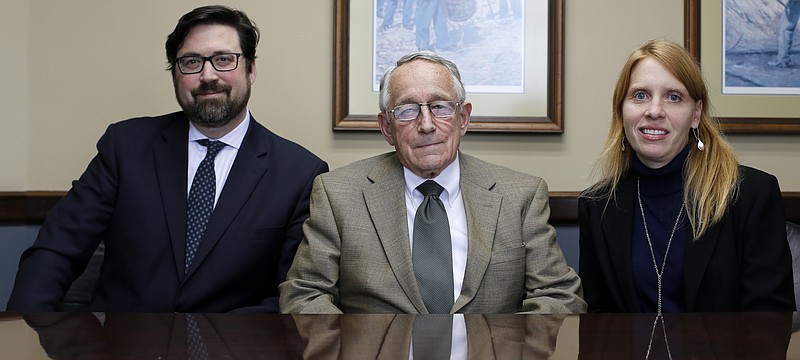Melissa Lasley had a bad day in April 2015: She backed into a car in a Hixson parking lot, failed a field sobriety test and was charged with driving under the influence.
A blood test by local authorities didn't find alcohol in her system, but when the Tennessee Bureau of Investigation retested her blood, as it often does, forensic scientists found Prozac, an antidepressant Lasley had been taking in prescribed, therapeutic doses for eight months, her lawyer said.
Lasley, 55, told the on-scene officer about that medication, court records show, but the officer said she didn't perform well on field sobriety tests and had a "distant" look in her eyes. Prosecutors worked on the impairment charges for a year and a half before dismissing them in October 2016.
As a controversial court decision continues to throw DUI cases and TBI testing into question in Chattanooga and beyond, some defense attorneys say such drug-related arrests have become common - even though they may be getting the wrong people.
"We have people all across this country who get drunk at night and they're a danger to society. That is not Ms. Lasley, who has no criminal history," her public defender, Coty Wamp, said in 2015. "There has got to be a difference between people that come in here high as a kite, three times the therapeutic level they're on, and Ms. Lasley. If there's not, where are we as a justice system?"
If police officers have probable cause on a scene - alcohol on someone's breath, a failed sobriety test, bloodshot eyes, a fatal wreck - they can get a search warrant to draw somebody's blood and have the TBI test it. That process can take months.
If the test doesn't detect alcohol, or finds an amount below the legal .08 limit, authorities often ask the TBI to check again for drugs, defense attorneys say. From there, prosecutors can connect a substance in someone's system to criminal impairment. But defense attorneys say those tests don't prove when the drugs were taken, or someone's tolerance for a drug.
"Say you've got someone who had two beers and got pulled over for something innocuous and the police take blood," attorney Andrea Hayduk said Tuesday. "It comes back negative or below the .[08] limit. So they run it for drugs. They see Xanax, and even if it's prescription, they're often charged. Our frustration is we have people who've been on it for years and it doesn't have an impact."
It's unclear how many DUI cases involve drugs versus alcohol or some combination of both.
TBI director Mark Gwyn estimated in 2014 that agents retest blood samples for drugs in 35 to 40 percent of impairment cases statewide. In 2016, 23,130 people were arrested statewide for DUI, with at least 627 of them coming from Hamilton County. The Chattanooga Police Department on Tuesday couldn't provide the number of DUI arrests or fatalities in the city in 2017.
Between 2012 and 2016, Hamilton County averaged 37 traffic fatalities a year, nine of which involved alcohol impairment, according to the Tennessee Department of Safety and Homeland Security.
But what happens when a person causes a minor accident with no injuries, has no alcohol in their system but tests positive for something like marijuana or a prescription drug they took a few days ago? Can prosecutors prove the drug caused the accident?
A spokeswoman for Hamilton County District Attorney General Neal Pinkston said prosecutors deal with each case on its own merits.
"There is no general 'What do we look for?'" said spokeswoman Melydia Clewell. "We prosecute the crimes that are brought to us in which there is evidence beyond a reasonable doubt."
Prosecutors recently argued that Ben Brewer, a commercial trucker from Kentucky who killed six people upon slamming into slowed traffic on Interstate 75 on June 25, 2015, did so because he was high on methamphetamine.
Brewer's defense attorneys countered prosecutors could only say he had the drug in his system. They couldn't prove when he ingested it or whether it factored into the crash, they said. Prosecutors said it's still illegal to consume meth. In January, jurors convicted Brewer on six counts of vehicular homicide, four counts of reckless aggravated assault and one count each of speeding and DUI.
"Just 'cause it's in there doesn't mean you can prove it was affecting them at the time," defense attorney Robin Flores said.
Authorities can track the overall effects alcohol has on a person's body. But the same may not be true for other drugs, including marijuana.
In a 2017 report to Congress, the National Highway Transportation Safety Administration said, "the level of THC [the psychoactive ingredient in marijuana] in the blood and the degree of impairment do not appear to be closely related."
All impairment cases that involve blood tests are on ice as the Tennessee State Attorney General's Office prepares to challenge a ruling last week by the Tennessee Court of Appeals that called a $250 blood testing fee the TBI collects in driving infraction cases "unconstitutional."
Jerry Summers, the local attorney who triggered the ruling, argued the fee creates the possibility of bias since the agency's scientists often testify in cases and only receive $250 if prosecutors win a case. As a result, any defendant who can't afford to independently verify the state's results loses their right to a fair trial, Summers said.
The agency has denied any conflict of interest and said in 2014 a lot of that money funds its forensic labs, its fingerprint database and other fees and law enforcement tools.
Contact staff writer Zack Peterson at zpeterson@timesfreepress.com or 423-757-6347. Follow him on Twitter @zackpeterson918.
